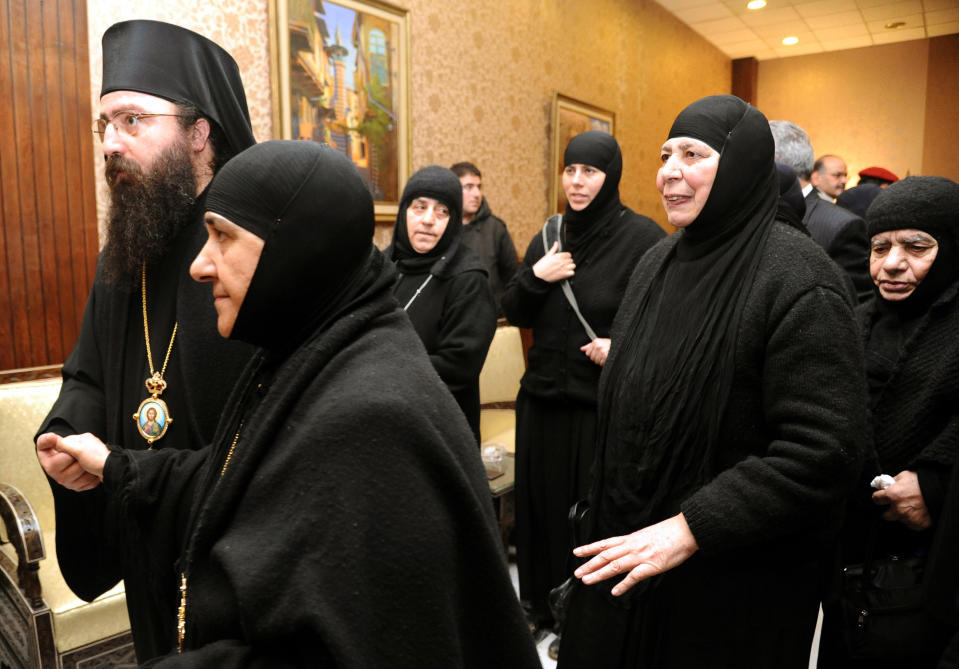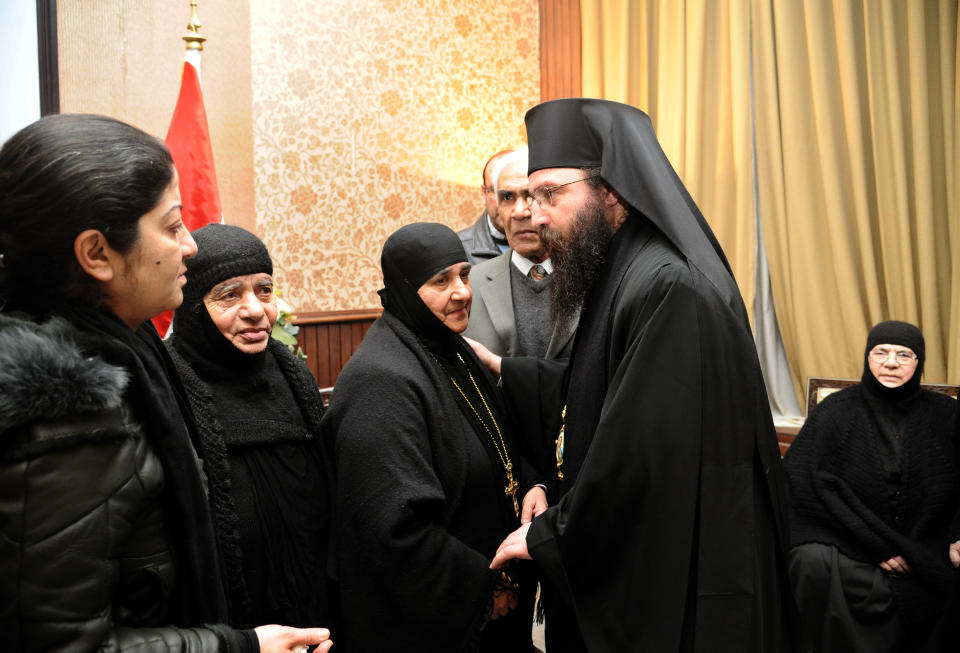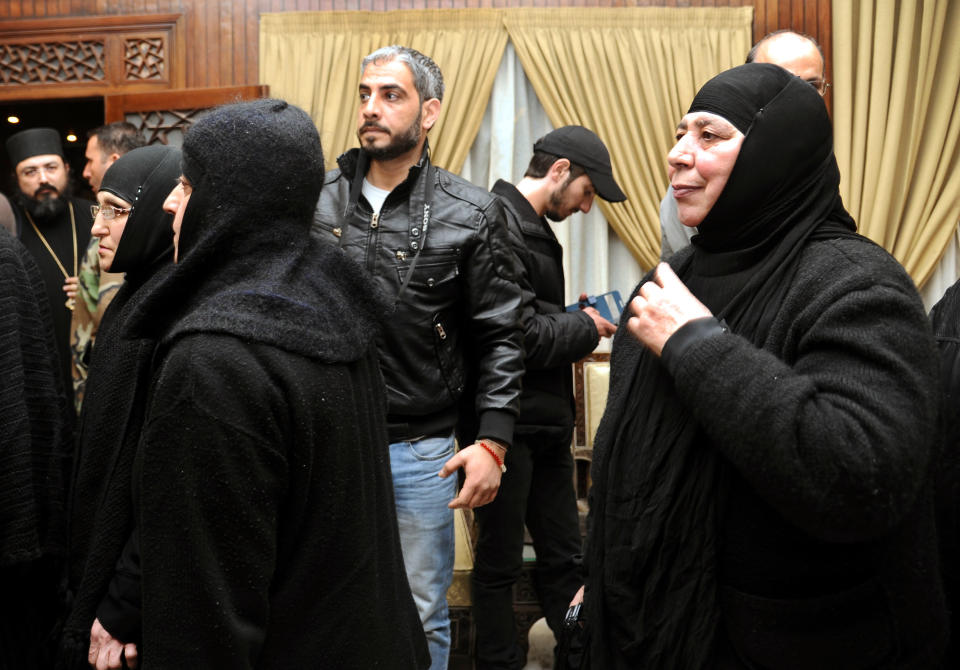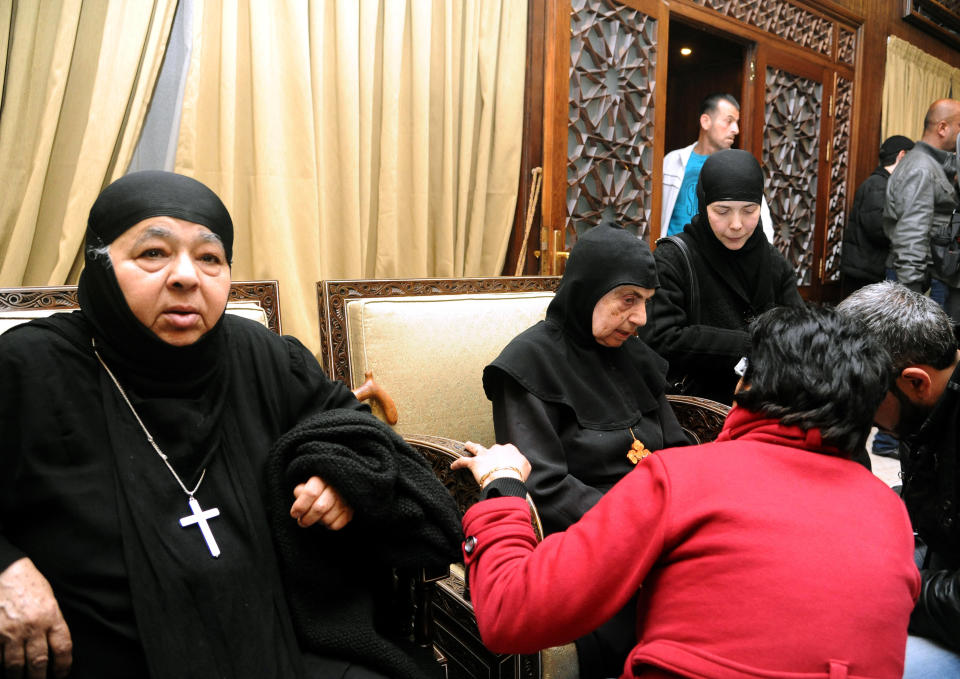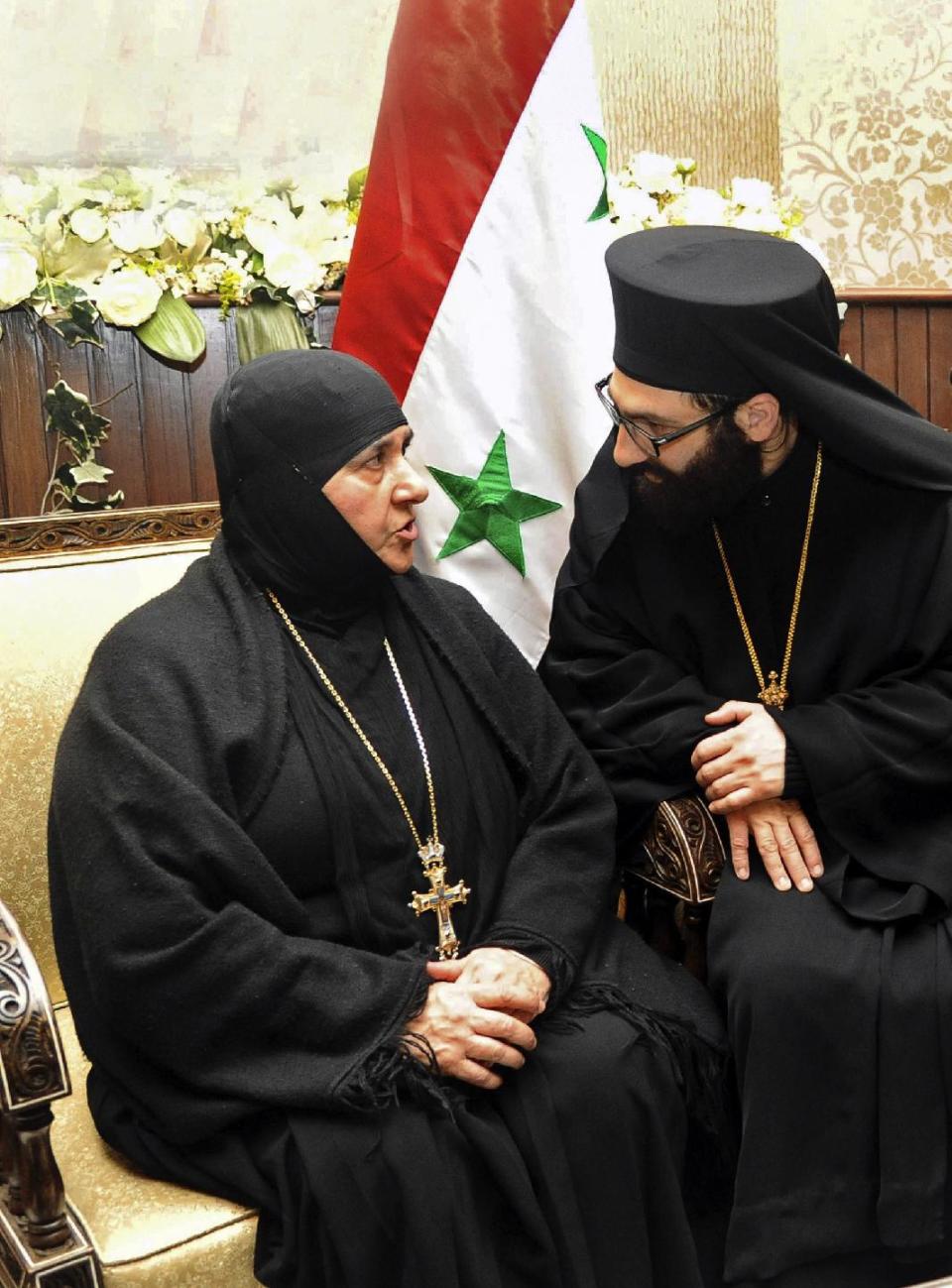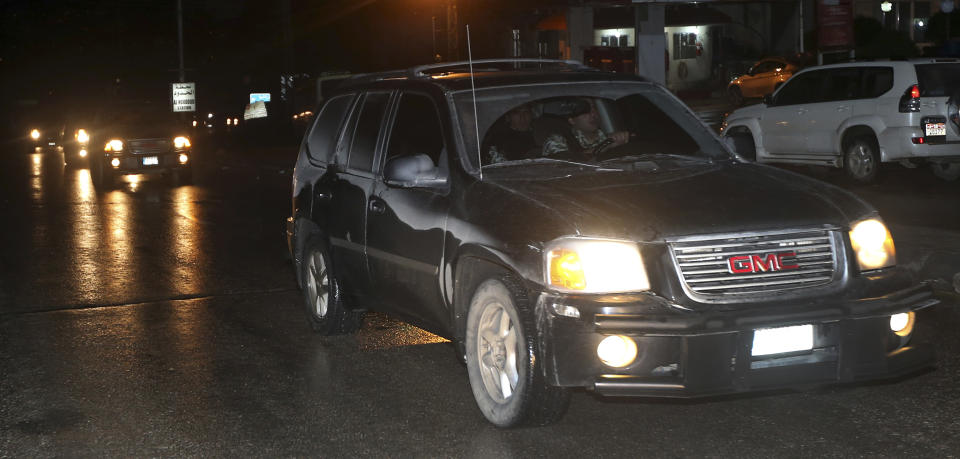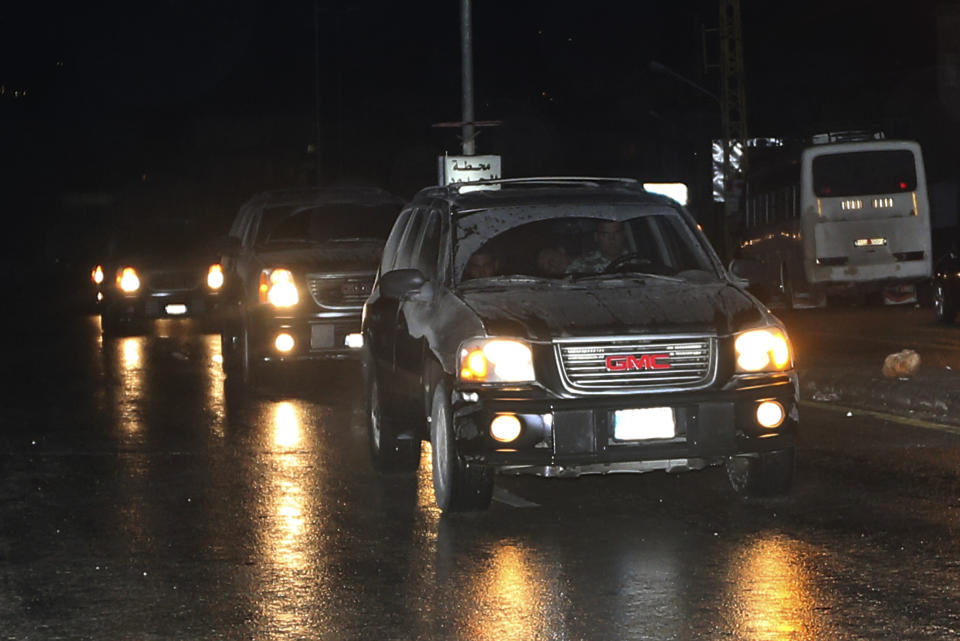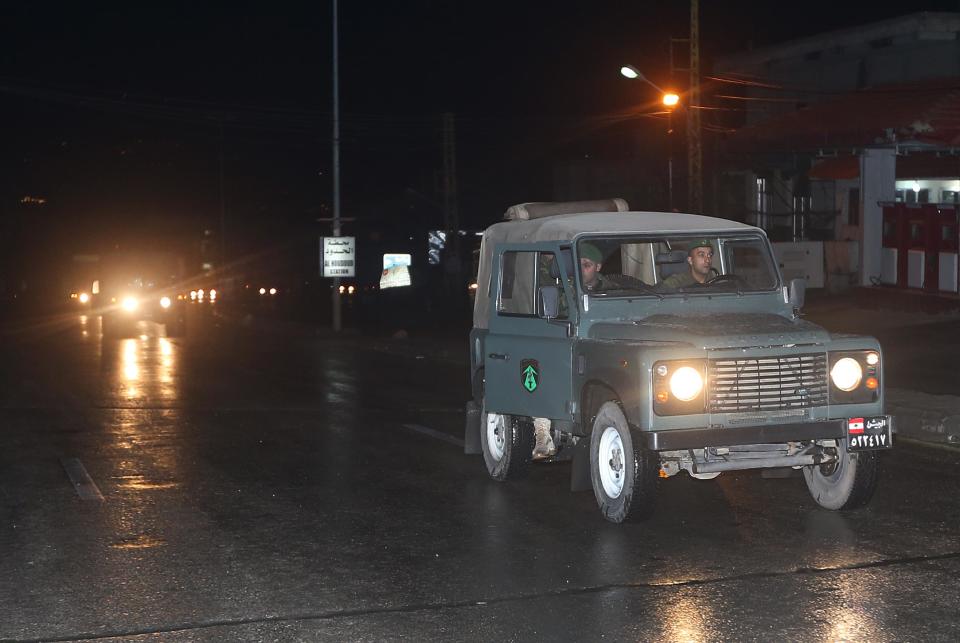Ordeal ends for Syria nuns, part of prisoners deal
DAMASCUS, Syria (AP) — Syrian militants released Monday a group of Greek Orthodox nuns in exchange for dozens of women held in government prisons — a rare deal between Damascus and al-Qaida-linked rebels that was mediated by Qatari and Lebanese officials.
The dramatic scene of the nuns being freed from vehicles in the dead of night along the Lebanese-Syrian border, bidding their captors a surprisingly friendly farewell, ended the women's three-month ordeal. The nuns were captured as opposition fighters overran a Christian village and were held in a border town. They were released as government-backed forces battled their way into the strategic border town in which they were held.
It provided an unusual example of regional actors cooperating to reach across the Syrian civil war's sectarian and ideological fault lines, which have sharply split the Middle East.
The energy-rich Gulf nation of Qatar, a chief backer of the rebels fighting to topple Syrian President Bashar Assad, was involved in the mediation. Lebanon's General Security Chief Maj. Gen. Abbas Ibrahim, a powerful figure trusted by the Lebanese militant Hezbollah group and its Syrian government allies, was on hand to receive the nuns early Monday.
The 13 women said they were treated well by their captors, members of the al-Qaida-affiliated Nusra Front. In a video released by the militant group, they appeared healthy saved for one elderly nun who was carried by a masked gunman to a waiting vehicle.
The video, posted by the Nusra Front on the internet Monday, showed the nuns and their captors chatting affectionately as they bid each other farewell.
An off-camera rebel voice told the nuns that God will reward them for their suffering. "May God reward every person who sought to resolve this problem," replied one nun.
As the women reach the car, the unseen rebel says, "I was so happy to be in communication with you and I hope that we can stay in communication, if God decides that. Please say hello to your families for me, and I hope you arrive safely."
The video appeared genuine and consistent with The Associated Press' reporting.
The Damascus-based Greek Orthodox Patriarchate for Antioch and All The East hailed the nuns' release Monday, saying their return to safety was "a message from heaven to all Christians to remain in this land (Syria) and coexist in complete harmony with Muslims."
The statement, carried by the Syrian official news service SANA, said the nuns will stay in the premises of the patriarchate and will return to Maaloula only after the town is "cleared of dirty terrorists."
Negotiations for the nuns' release had been going on and off for weeks. Qatari Foreign Minister Khalid bin Mohammed al-Attiyah said in a statement carried by his country's official news agency that the energy-rich Gulf nation had been involved in the mediation that freed the nuns since December.
Opposition activists said the nuns had been held in a villa in Yabroud, a strategic Syrian town near the border with Lebanon that that has been under opposition control for much of the conflict. In recent weeks, government forces have been on the offensive in the area. They've tightened the noose on the town in the past two days, increasing the pressure on the rebels to reach a deal to release them.
Ibrahim, Lebanon's General Security Chief, and al-Attiyeh, Qatar's chief diplomat, said Monday that the Syrian government met a demand of the rebels to releasing more than 150 Syrian women held in prisons.
The Syrian government typically does not comment on releases in exchange for people held by rebels, and did not confirm the women's release Monday.
The report of the women's release from government custody could not be independently confirmed, but Rami Abdurrahman, head of the Britain-based Syrian Observatory for Human Rights, said 150 women and three children were freed. They were the sons and daughters of one of the female prisoners, he added.
Syrian authorities have detained children in the past, usually to pressure family members to surrender.
The Nusra video showed the three children at the scene where the exchange took place. One little girl wept for her mother, and a masked rebel gunman held another child as he shouted "God is great!" in celebration.
Monday's exchange was reminiscent of a deal reached in October, when nine Lebanese pilgrims held in Syria for a year and a half were exchanged for two Turkish pilots held hostage in Lebanon. That deal, negotiated by Qatar and Palestinian officials, reportedly also included freeing dozens of women held in Syrian government jails to satisfy the rebels who abducted the pilgrims.
The nun's ordeal began in early December, when they were seized by rebels from a convent in the ancient Christian town of Maaloula that was overrun by rebels.
Upon their arrival to Damascus, the capital's residents gave the nuns a warm welcome at the Church of the Cross located in the predominantly Christian neighborhood of Qassaa, where prayers were held Monday evening marking their safe return.
Although the nuns appear to have been treated well, their seizure confirmed the fears of many Syrian Christians that they were being targeted by extremists among the rebels in the increasingly sectarian three-year conflict.
The country's chaotic mix of rebel groups is overwhelmingly Sunni Muslim, while minorities include Christians, Shiite Muslims and Alawites — whose sect is a Shiite offshoot. Most have sided with Assad or remained neutral, fearing for their fate should rebels take power. Assad is an Alawite.
Two bishops were seized in rebel-held areas in April, and an Italian Jesuit priest, Father Paolo Dall'Oglio, went missing in July after traveling to meet militants in Raqqa. None have been heard from since.
"Of course we are relieved by the reports that the nuns have been released. We continue to call for the immediate and unconditional release of all those who remain unjustly detained in Syria," U.S. State Department spokeswoman Jen Psaki told reporters in Washington.
Also Monday, the international rights group Amnesty International accused the Syrian government of committing war crimes and crimes against humanity by blockading and starving civilians in the southern Damascus neighborhood of Yarmouk.
Amnesty said it estimated 128 people starved to death in Palestinian-dominated Yarmouk since a yearlong blockade on the area was tightened in July by forces loyal to Assad, who sought to flush out rebels and to punish civilians for harboring them.
Efforts to reach a truce in Yarmouk allowing food deliveries to starving residents have repeatedly collapsed.
___
AP reporters Diaa Hadid in Beirut and Adam Schreck in Dubai contributed reporting.
